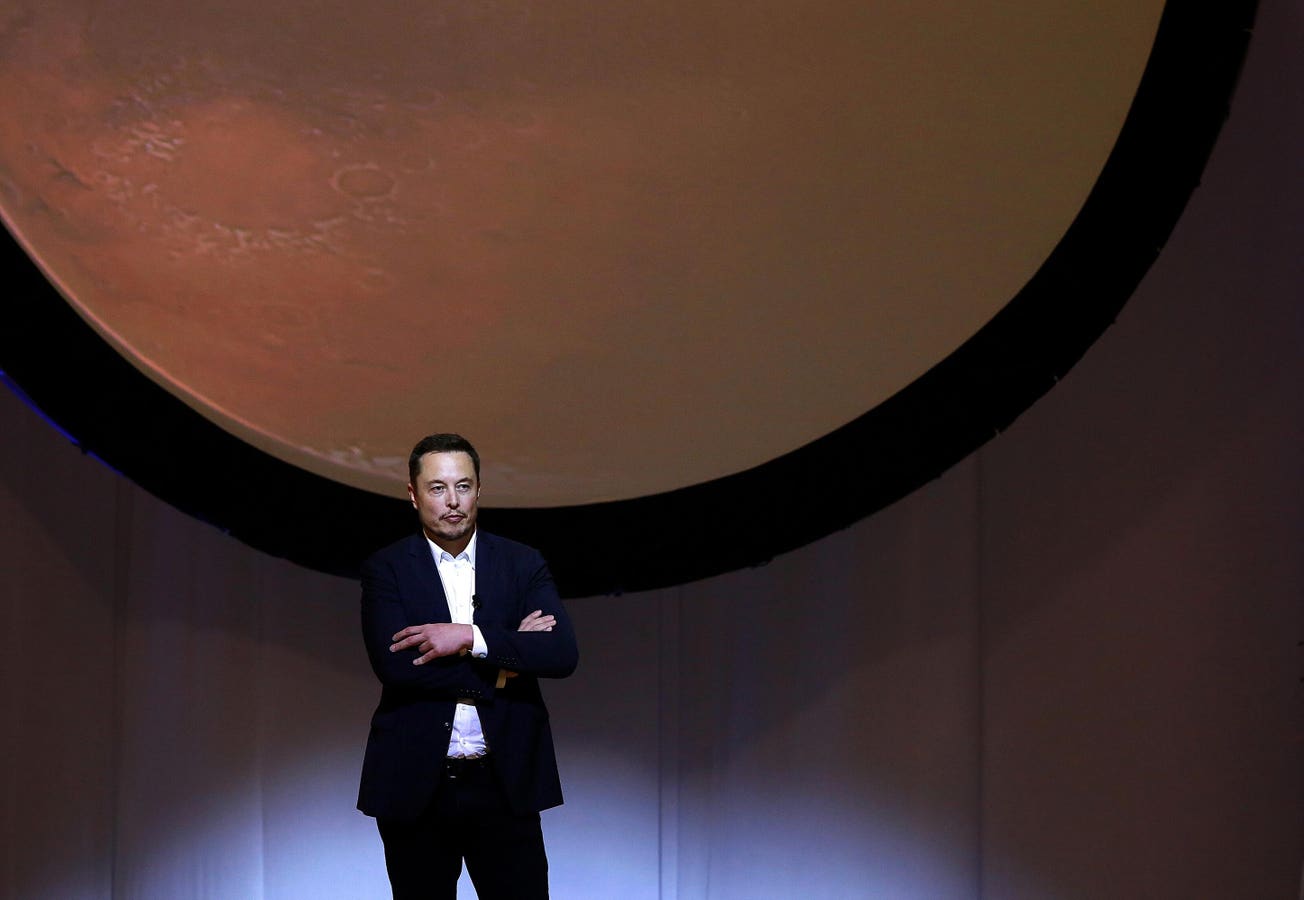Elon Musk, chief executive officer for Space Exploration Technologies Corp. (SpaceX), pauses while … More
It’s been almost a decade since Elon Musk stood in front of a crowd in Guadalajara, Mexico and unveiled his magnum opus of a plan to take us all, or at least our species, to Mars. Today, ahead of the latest Starship test launch, he updates that plan with a new timeline that might see humans on the Red Planet by 2029 and a few more specifics, including a robot named Optimus.
Musk’s plan to make humanity multi-planetary is running several years late, but that’s probably no surprise to much of anyone, including Elon himself who has often acknowledged his tendency towards aspirational timelines.
The more significant surprise over the past decade has been the shift in Musk’s politics and his controversial rise to prominence in that sector, from his purchase and pivot of Twitter to X to his chainsaw-wielding antics at the head of DOGE earlier this year.
These are just a few branches on the great oak tree of Musk’s public persona that will make him one of the more historic figures of the 20th century. But all his accomplishments and all the controversies will be swept into the background of his biography if he actually pulls off his Mars vision on anything like the scale he’s proposed (which is, by the way, a Martian city of up to a million humans).
Is Elon Musk the Right Man for Mars?
Still, the boat-load of baggage that follows Musk around makes it prudent to wonder if he is truly the best man to lead us to another planet for the first time in thousands of years of human history.
Everything I want to believe about people, the world and the way that I’d like it to work makes me think he’s not the right man. This feeling isn’t rooted in any of his most high-profile political antics of late, but instead in moments like one in particular in late 2020 when he gave the order to launch a Starship prototype without final safety approvals from the FAA. This led to a delay of the next test flight and an odd resolution between the company and the regulator that was not publicly disclosed but amounts to a slap on the wrist.
TOPSHOT – A person looks on as SpaceX’s huge Super Heavy-Starship is unstacked from the booster as … More
Musk has clashed with regulators in numerous ways over the years and leveled criticisms of outdated bureaucracy that may be justified and surely inform his later efforts at DOGE. Nonetheless, the way Musk chooses to fight back against bureaucratic bloat often seems hubristic and reckless.
This is simply not the man I want leading a societal experiment on a new planet.
And yet, it is hard to argue with the results he has produced at the helm of SpaceX. While behind on his own aspirational timelines, the development of Starship and the family of reusable workhorse Falcon rockets like Falcon 9 and Falcon Heavy has run circles around NASA’s contractors and revolutionized the space industry.
It’s uncomfortable to admit, but I think that while Musk is not suited for any role near governance and civil society, he might be the best if not the only person realistically able to provide us with the transportation to another world in this generation. And this is a journey worth undertaking.
Why Mars is Worth the Trip
Musk’s central argument that we need Mars as a sort of lifeboat for humanity is not particularly a strong one, especially in the short term. Even if humanity is in the process of actively making Earth uninhabitable as some of the more extreme activists argue, and at the same time we were to begin actively terraforming Mars to be more habitable, it will still be centuries (if it is even possible at all) before any rational life form might prefer life on Mars. And yes, I’m including even worst case scenarios like fallout from nuclear war on Earth.
research station on planet Mars
And yet, going to Mars is worthwhile because of the many technological breakthroughs that will likely result in order to achieve the goal, and the dividends that those advancements will pay on Earth to improve well being for all of us. I’ve often cited how the original space race between the US and Soviet Union gave us a number of innovations; just one of these is the satellite revolution that now underpins our entire globalized society of instantaneous communications and data transport, sharing and availability.
This thought alone makes me root for Elon to succeed, despite how so many of his other actions leave my neck sore from shaking my head repeatedly.
But I do also buy into the vision of a multiplanetary species over the very long term, likely well beyond my lifespan. Mars may never be another Earth, but the idea of an escape hatch or a pressure valve for our planet is logical.
I frequently hear the argument that it doesn’t make sense to build on another planet and inevitably ruin it as humans have done to the Earth. Or the cousin to this argument that the resources would be better spent preserving Earth. But the logic fails because being truly multiplanetary in the Muskian vision would actually take pressure off of Earth’s ecosystems and again, innovation driven through space exploration is also likely to bolster sustainability on Earth. Not to mention that diverting the resources currently going towards Starship development and using them for environmental restoration is a gross oversimplification of how capital allocation actually works.
WASHINGTON, DC – MAY 9: Jeff Bezos, founder of Amazon, Blue Origin and owner of The Washington Post … More
Jeff Bezos’ Blue Origin actually has a very inspirational vision for how space exploration could benefit Earth by moving much of heavy industry off the planet and preserving Earth as a “garden planet.”
The point is – you may not like Musk for a number of reasons, but the notion of humans expanding beyond our home planet is not his novel idea and it’s not a bad one. It may actually be a necessary one.
It comes down to what you think about humans. On balance, are we a destructive or constructive species? Is the pre-industrial medieval world preferable to the globalized, modern mixed bag of today? There’s an interesting discussion to be had there, but the answer to me is a pretty obvious no and I’m interested to go farther. Perhaps with Elon.
But when it comes to Mars, I draw more inspiration from the vision of a planetary scientist named John Lewis who was at the University of Arizona and whom I saw speak over a decade ago. He posed a simple question: if you think the modern society we have built is at all interesting or impressive, just imagine what a few quadrillion humans spread out across the solar system can accomplish.








